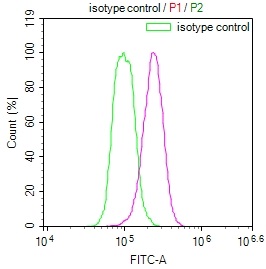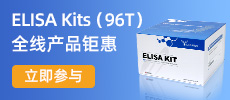KCNK13 Antibody, FITC conjugated
-
中文名稱:KCNK13兔多克隆抗體, FITC偶聯(lián)
-
貨號(hào):CSB-PA862058LC01HU
-
規(guī)格:¥880
-
其他:
產(chǎn)品詳情
-
產(chǎn)品名稱:Rabbit anti-Homo sapiens (Human) KCNK13 Polyclonal antibody
-
Uniprot No.:
-
基因名:KCNK13
-
別名:KCNK13; Potassium channel subfamily K member 13; Tandem pore domain halothane-inhibited potassium channel 1; THIK-1
-
宿主:Rabbit
-
反應(yīng)種屬:Human
-
免疫原:Recombinant Human Potassium channel subfamily K member 13 protein (292-408AA)
-
免疫原種屬:Homo sapiens (Human)
-
標(biāo)記方式:FITC
-
克隆類型:Polyclonal
-
抗體亞型:IgG
-
純化方式:>95%, Protein G purified
-
濃度:It differs from different batches. Please contact us to confirm it.
-
保存緩沖液:Preservative: 0.03% Proclin 300
Constituents: 50% Glycerol, 0.01M PBS, PH 7.4 -
產(chǎn)品提供形式:Liquid
-
儲(chǔ)存條件:Upon receipt, store at -20°C or -80°C. Avoid repeated freeze.
-
貨期:Basically, we can dispatch the products out in 1-3 working days after receiving your orders. Delivery time maybe differs from different purchasing way or location, please kindly consult your local distributors for specific delivery time.
-
用途:For Research Use Only. Not for use in diagnostic or therapeutic procedures.
相關(guān)產(chǎn)品
靶點(diǎn)詳情
-
功能:Potassium channel displaying weak inward rectification in symmetrical K(+) solution.
-
基因功能參考文獻(xiàn):
- Dysregulation of a potassium channel, THIK-1, targeted by caspase-8, accelerates cell shrinkage. PMID: 27566292
- In cell and tissues co-expressing THIK1 and THIK2, heterodimeric channels may contribute to cell excitability. PMID: 25148687
- expression in cell hypoxia PMID: 16683720
- THIK-1 and THIK-2 are abundantly expressed in the proximal and distal nephron of the mammalian kidney. PMID: 18209473
-
亞細(xì)胞定位:Membrane; Multi-pass membrane protein.
-
蛋白家族:Two pore domain potassium channel (TC 1.A.1.8) family
-
數(shù)據(jù)庫鏈接:
Most popular with customers
-
-
YWHAB Recombinant Monoclonal Antibody
Applications: ELISA, WB, IHC, IF, FC
Species Reactivity: Human, Mouse, Rat
-
Phospho-YAP1 (S127) Recombinant Monoclonal Antibody
Applications: ELISA, WB, IHC
Species Reactivity: Human
-
-
-
-
-



















